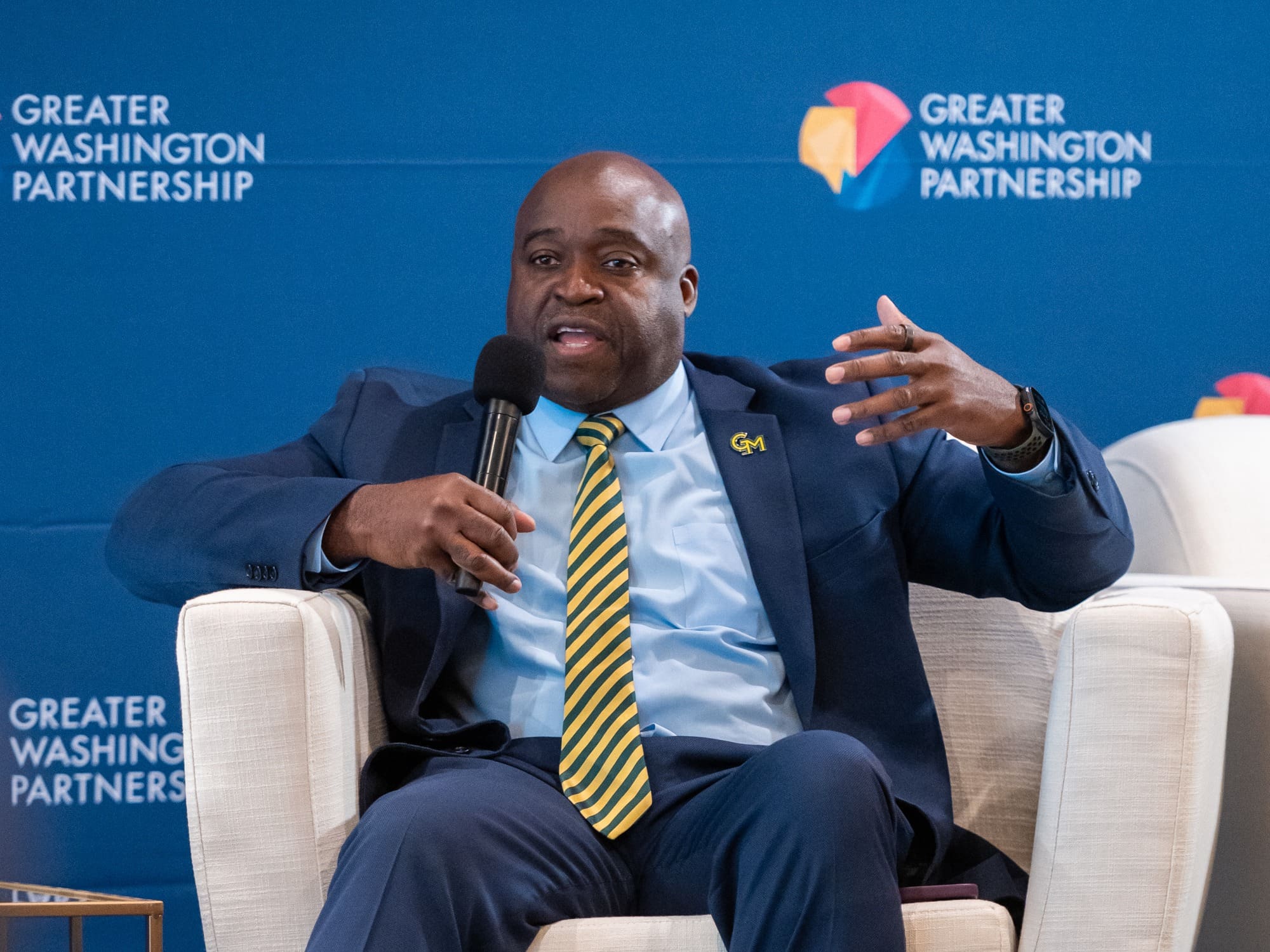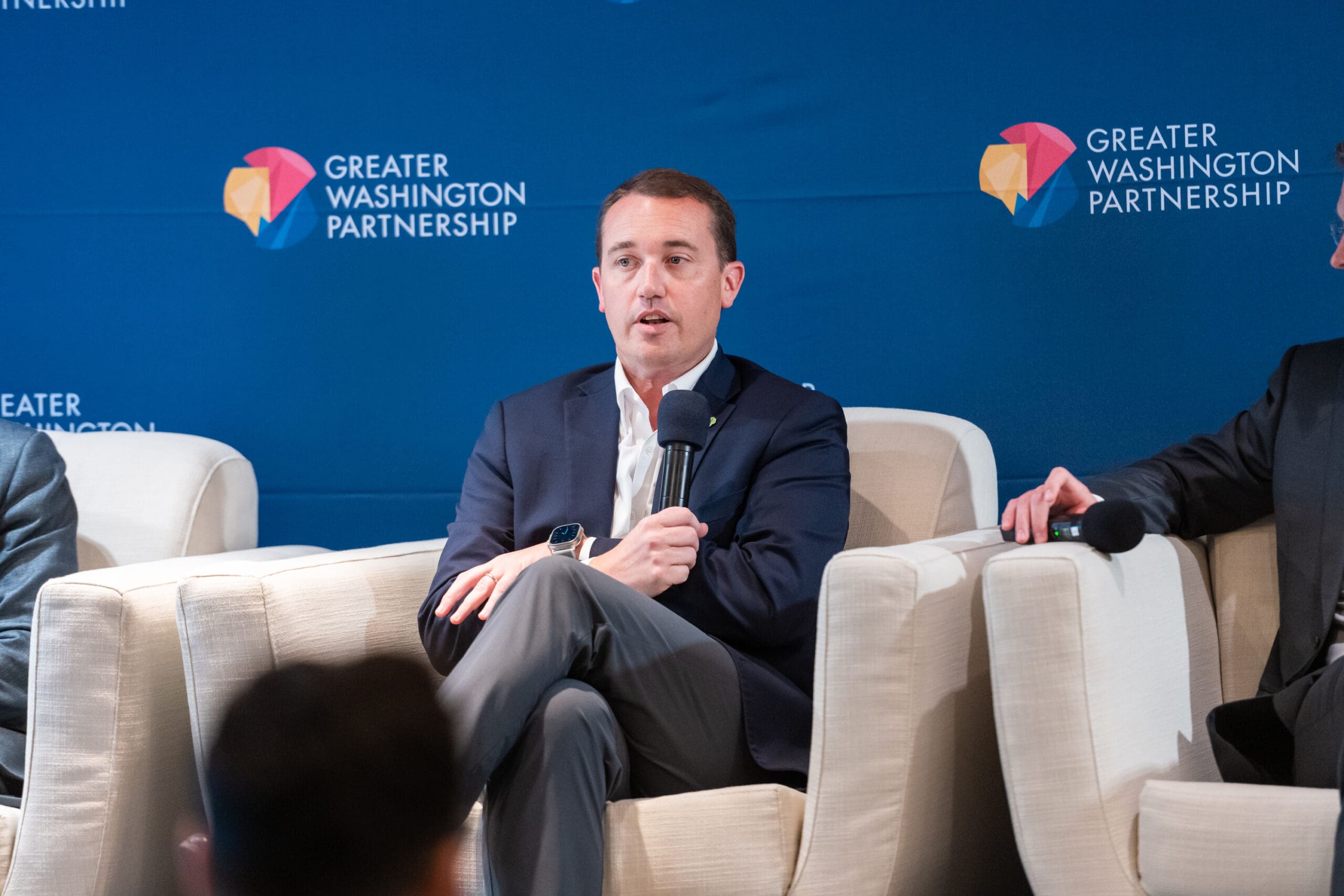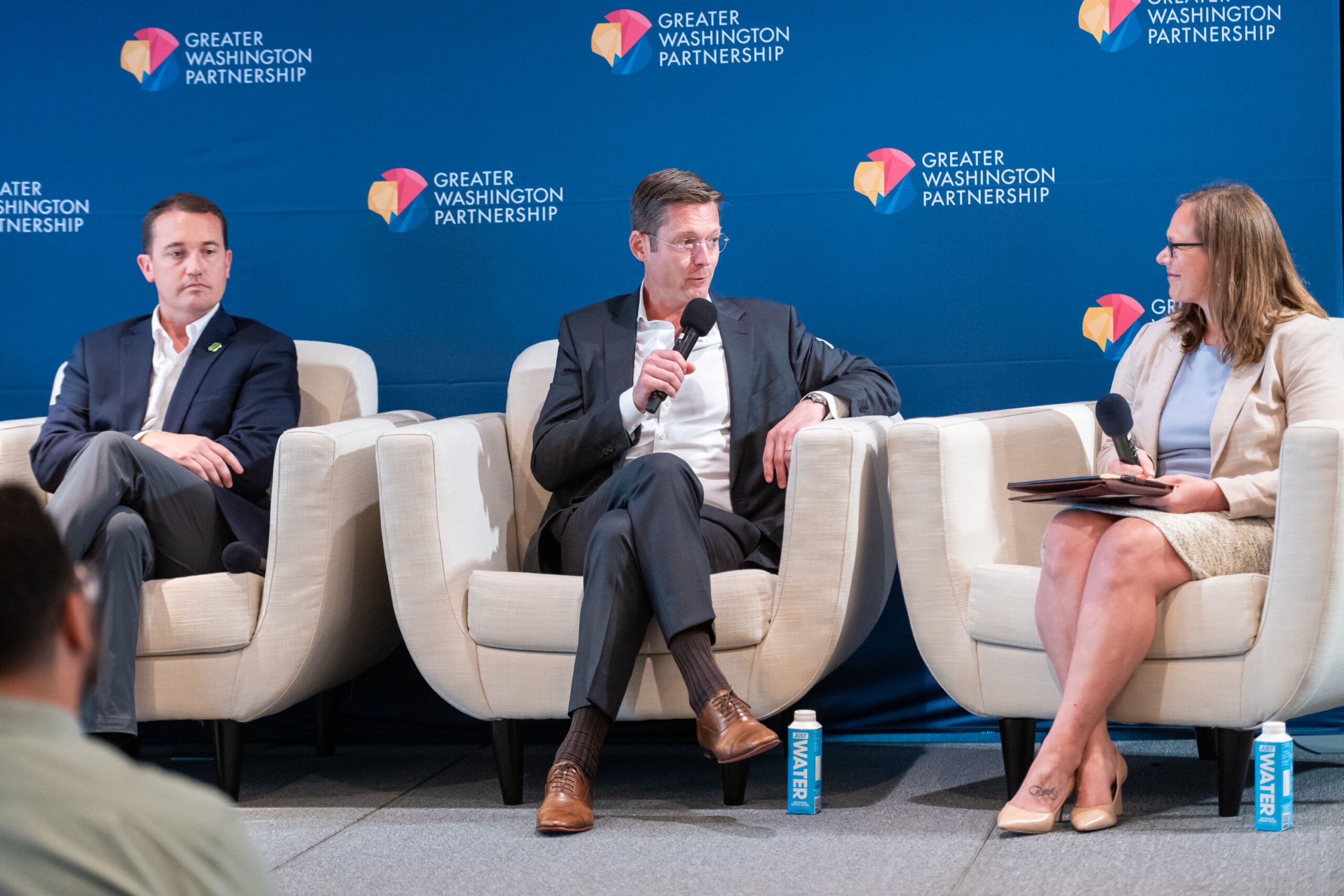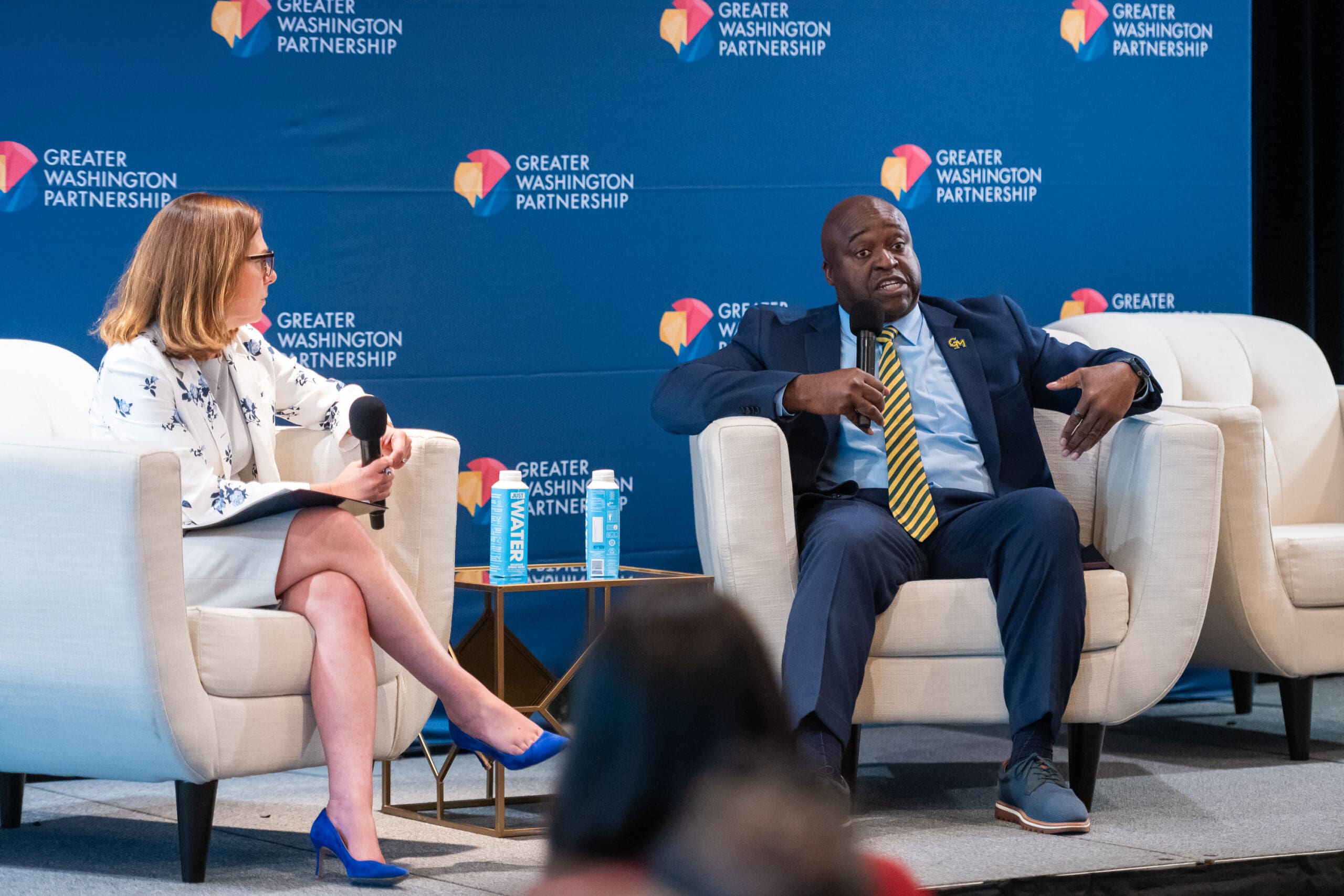This year has brought significant changes to the labor market in Maryland, DC and Virginia. The number of workers employed by the federal government —traditionally comprising a large share of the region’s workforce —is decreasing, and technology’s rapid evolution is further shifting in-demand roles and skill sets for jobseekers. The moment is ripe for exploring new opportunities for the region’s workforce, while continuing to strengthen pathways into sectors we’ve traditionally relied on as a foundation for our economy.
To support this exploration, the Partnership launched the Economic Resilience Series, a set of conversations designed to map the region’s unique assets and strategically leverage opportunities to build a more resilient and dynamic economy amid a changing landscape. The first convening in this series, Future of Talent: Emerging Industries, occurred on July 9 and brought together leaders from across academia and business to discuss fields that are growing and will have talent opportunities in the years to come.
Event Overview
Future of Talent: Emerging Industries took place at the Johns Hopkins Bloomberg Center in Washington, DC. Johns Hopkins University, a Greater Washington Partnership founding Board partner, opened the Bloomberg Center in 2023 as a space for cross-sector leaders to innovate and collaborate on solving tough global challenges.
 |
 |
Corey Lewson, Workforce Development Program Manager at Hopkins Medicine, opened the event with remarks outlining Hopkins’ innovative approaches to workforce development. Attendees then heard an intimate fireside chat between two key leaders in our region’s talent ecosystem: Nora Gardner, Senior Partner at McKinsey & Co., and Dr. Gregory Washington, president of George Mason University. Their discussion provided context for the current moment and how higher education is poised to respond.
The event culminated in a panel featuring four industry leaders that shared both career opportunities in their respective fields, and strategies to prepare talent to access those opportunities: Robby Demeria, Chief Corporate Affairs Officer, Phlow (biotech and pharma tech); Zach Leonsis, President, Media & New Enterprises, Monumental Sports & Entertainment (sports, media, and entertainment); Bo Machayo, Head of U.S. Government & Public Affairs, Micron Technology (advanced manufacturing); and Michael Sheets, Chief Human Resources Officer, Red Cell Partners (AI and venture-backed capital).
Key themes, insights and video recording from the event:
To Meet the Moment, Employers and their Partners Need to be Innovative.
The moment of workforce transition our region is in requires nimbleness, agility, and innovation, not only for employers, but for educators and training providers as they adapt to employers’ changing needs.
President Washington highlighted postsecondary certificate programs as an opportunity for colleges to more quickly stand up programs in response to rapid change in labor market demand. He also shared details about the efforts of the FUSE campus, a new building in Arlington with designated spaces for the private sector to collaborate with academia and foster innovation.
 |
 |
 |
Industry leaders on the panel underscored the need for more innovation, with both Machayo and Demeria sharing that their industries’ talent needs wouldn’t be filled without creative, innovative partners. Micron’s expansion in Manassas, Virginia will lead to thousands of job openings in semiconductor manufacturing, and Machayo called for partners who are willing to think outside the box to support the business in filling these openings. Demeria mentioned the work of the Community College Workforce Alliance, which has taken a cross-sector approach to building the pharmaceutical workforce in the Richmond area, as an example of partners working innovatively together to meet a need.
Developments in Technology Could Have a Broad Impact on the Region’s Workforce.
Innovative partnerships are particularly pressing as technology changes rapidly, impacting some of the traditional roles and skill sets that have been in-demand in the last several years. Gardner opened the event by noting that the region continues to be a tech hub, with a higher than national average percentage of the population working in technology. President Washington underscored this point, pointing out that 41% of George Mason graduates go on to work in tech. This deep tech footprint is an asset for the region, but means that regional leaders in industry, academia, government, and nonprofit should be paying close attention to how tech is changing, or risk falling behind.
Further, each industry leader expects in-demand careers in their fields to change as technology continues to change. Monumental recently brought on the company’s first-ever Chief Technology Officer, a testament to tech taking center stage in the world of sports & entertainment. Leaders at Micron and Phlow are also paying careful attention to how AI will shift talent needs in advanced manufacturing and biotech and adapting accordingly.
As an HR leader with expertise in tech hiring, Sheets offered a word of advice to those who train tech talent and current and aspiring members of the tech workforce – most of the roles within Red Cell Partners’ ecosystem will likely require some literacy in AI, which is not just changing in-demand skillsets for their talent, but rather systemically shifting the way employees work.
Diverse Backgrounds Are an Asset to Business.
Each industry leader touted the importance of individuals with diverse backgrounds joining their fields, bringing attention to the array of backgrounds and experiences that can make someone a fit for an organization, even if the skillset isn’t a 1:1 match.
 |
 |
When asked about transition opportunities for mid-career workers, Leonsis flagged the plethora of opportunities available in sports, media and entertainment, naming that Monumental Sports & Entertainment has talent needs across fields that may not require direct sports experience, like strategy, government relations, and business intelligence. Demeria mentioned that much of the work to build the pharmaceutical industry in Richmond has focused on mid-career talent, and that minimal upskilling and reskilling is required for a successful transition into the field.
Sheets mentioned the unique skill sets that veterans bring to the workplace, like thinking under pressure, and noted that some veterans have leaned on their experiences to provide the ideas that led to Red Cell Partners most innovative companies. This emphasis on hiring former members of the military is reflected at Micron, as well, where 20% of the local workforce identifies as veterans.
Economic Development and Workforce Development Are Deeply Intertwined.
Overall, the convening reflected that effective workforce development can’t exist without economic development, and vice versa. Each speaker touched on how they intersect efforts across these two spaces, and ways leaders in each field can collaborate.
George Mason is leading the charge on this front, with efforts like Mason Enterprise serving as the largest business incubator in the state of Virginia. President Washington shared how Mason Enterprise taps into the training and education offered by Mason to better equip business leaders to succeed. The FUSE campus also has space to foster startups. These spaces, situated alongside learners preparing for the jobs of the future, provide a tangible example of economic and workforce development coming together.
 |
 |
The intersection of economic and workforce development was top of mind for panelists, as well. In Richmond, Demeria and other cross-sector leaders in bio and pharma tech are working to simultaneously attract new businesses to the area and ensure that when the businesses establish their footprint there, they have the talent they need to succeed.
Machayo touched on the positive impact that the Manassas facility would have on the region’s economy and called out the conditions that make Commonwealth of Virginia such a key partner in the efforts. Finally, Monumental is continuing to invest deeply in Washington, DC, with the new renovation of the Capital One Arena serving as an economic driver for the city, creating new job opportunities and bringing new visitors into the space.
What’s Next?
Future of Talent: Emerging Industries is a starting point for the Partnership’s ongoing efforts to position the region for long-term growth and competitiveness. We look forward to continuing to partner with the leaders who offered their insights, and pulling in key stakeholders from across the region to further inform this work.